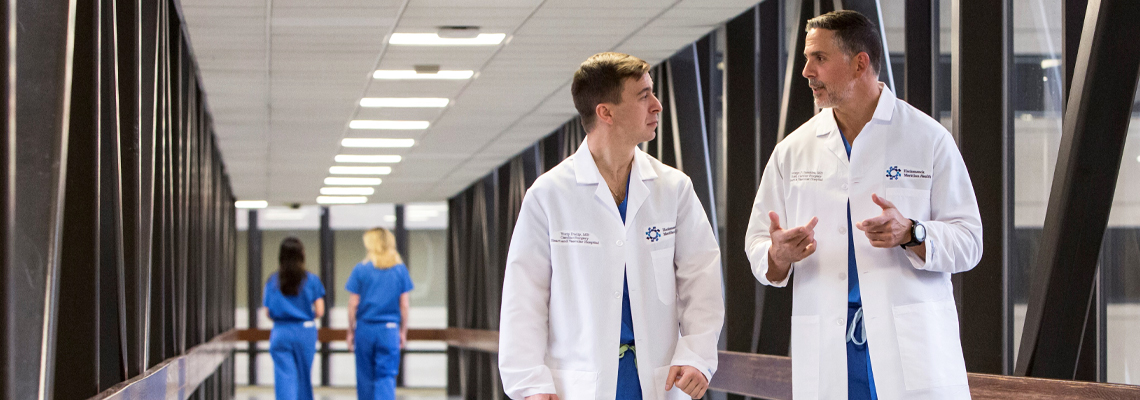
The steady beat of Matthew Keenan’s days all center around drumming, whether in his high school marching or concert band, or the sought-after rock band he joined through his music school. So it’s not surprising that the Middletown, New Jersey, teenager was laser-focused on resuming his passion after being treated for a complex brain tumor that threatened not only his drumming skills, but his entire future.
Even his highly trained doctors couldn’t have predicted that Matthew would be playing onstage again within a month, with all signs pointing to a cure.
“Above all, I think what we do that’s better than other hospitals is that we are willing to go the extra mile for our patients,” says Lawrence Daniels, M.D., medical director of pediatric surgery and the pediatric neurosurgeon at K. Hovnanian Children’s Hospital who operated on Matthew and led his care. “We have all the technology and bells and whistles here, but we also live in the community and there’s a sense of pride that we’re building something that wouldn’t be here without us. That’s what allows us to achieve the results we get.”
Precarious Path
In November 2018, the Middletown High School North senior began experiencing throbbing headaches and noticed his coordination was off, causing his marching band drumming techniques to seem clumsy and difficult. After going to the emergency room with his unrelenting symptoms, CT and MRI imaging scans showed a large mass in his cerebellum, the part of the brain that controls movement and speech.
The tumor wasn’t cancerous, but its sheer size and reach into three distinct compartments in Matthew’s brain still meant it endangered his ability to function normally, or worse.
“If we hadn’t treated it, it likely would have continued to grow and probably would have obstructed the flow of fluid in his brain,” Dr. Daniels says. “It would have taken his life.”
The only option was surgery, since removing the mass would also relieve pressure on Matthew’s brain and provide tissue samples to test for genetic clues to the tumor’s behavior. But even the obvious treatment course wasn’t without potential drawbacks.
“We know we’re dealing with very important real estate in the brain,” Dr. Daniels says. “Our concern was that taking out this tumor could cause damage to the cerebellum and affect his balance, coordination, speech, cognition—all of those things. We had to run numerous tests and make sure that our entire surgical team agreed with our surgical plan before we even brought him into the operating room.”
Deep Collaboration
A key group of Jersey Shore specialists were on hand for Matthew’s operation on November 15, 2018, which stretched to 16 hours due to the complexity of his tumor. With intricate precision, Dr. Daniels separated tumor tissue from normal brain tissue, sending sections to pathologists for immediate analysis about the lesion’s cell type.
“You’re taking extra time and care to meticulously resect the tumor in a manner to preserve as much of the rest of the brain as possible and keep his function intact,” Dr. Daniels explains. “That’s the big difference between the outcome in this surgery and what you might typically find in a patient with this tumor. It’s certainly not usually someone who goes back to playing drums a month later.”
“We made game-time decisions while operating on this tumor, going in and planning our approach together,” he continues. “Some hospitals don’t have this multidisciplinary approach. But when you have the opportunity to do it the way we can, it influences your judgment and allows us to expect the type of results we obtained in this case.”
Cheering Him On
Getting back to his beloved drums required comprehensive rehabilitation. Working with physical, occupational and speech therapists, Matthew was on a mission to perform in Middletown North’s winter concert.
“I have more of a direction and purpose in life because of music,” says Matthew, who plans to attend community college in the fall. “It surrounds me with people and memories I’ll never forget.”
Also unforgettable for Matthew, his parents and his classmates, was Matthew’s emergence onto the high school stage for the holiday recital just weeks after his surgery. A month later, Dr. Daniels and other members of Matthew’s Jersey Shore team gathered to cheer him on as he and his rock band performed at The Stone Pony in Asbury Park, New Jersey.
“I was very impressed and somewhat amazed,” Dr. Daniels says. “I’m very proud of his grit and the way he’s approached a very difficult situation. I admire his tenacity. You can tell his passion for something he loves has driven him to recover in an astounding way.”
For his part, Matthew is anxious to put the experience fully behind him and concentrate on his music. With no major medical crisis before this point, the 18-year-old was always intent on a quick recovery.
“I’m lucky enough to confidently say there are no significant or even minor changes in my life,”
he says. “I’ve returned to everything I’ve ever done and everything I was.”
Discover the early signs of a brain tumor.
Learn more about K. Hovnanian Children’s Hospital’s Pediatric Neuro-Oncology program, the only one of its kind in the region. Learn more about neurosciences across Hackensack Meridian Health.
Dr. Daniels is board certified in neurological surgery. To make an appointment, call 800-822-8905. To find a provider near you, visit HackensackMeridianHealth.org.